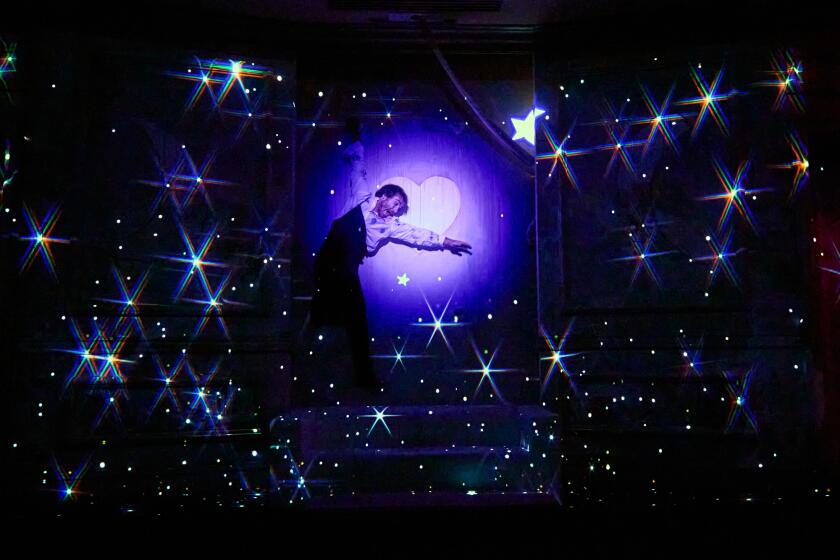What’s Sparkling on the London Stage : Despite some theaters’ financial woes, business is brisk in the West End where ‘Miss Saigon’ is packing them in
The Royal Shakespeare Company is having its financial woes, the Savoy Theatre has burned down, the Royal Court still hasn’t re-opened its Theatre Upstairs. (It is expected to, within the next two months.) But in the West End where cutbacks in subsidy are not an issue, business is as brisk as the weather and you don’t feel the pain. British theater, true to British character, puts a good face on things.
While Broadway is in its usual Brit grip, Americans are not badly represented in London. Stephen Sondheim’s “A Little Night Music” and Cole Porter’s “Anything Goes” light up the Piccadilly and Prince Edward, respectively. Arthur Miller’s “The Price” is at the Young Vic. Miller himself was there during rehearsals. Strong productions of August Wilson’s “Ma Rainey’s Black Bottom,” Martin Sherman’s “Bent” and Dion Boucicault’s “The Shaugran” are in the National repertoire. And even John Patrick Shanley’s “Savage in Limbo” recently had a run at the tiny DOC Theatre Club.
On other fronts, “The Liar” has reaped enviable reviews in a Jonathan Miller version of the Corneille play at the Old Vic. And “Shadowlands,” with Nigel Hawthorne and Jane Lapotaire re-enacting the love story of C.S. Lewis and American poet Joy Davidman in a script by William Nicholson, has been almost reverentially received.
The megamusicals are all still very much in place and in demand: “Cats,” “The Phantom of the Opera,” “Les Miserables,” “Aspects of Love.” But the glitziest queen of the West End blockbusters remains “Miss Saigon,” the latest Alain Boublil/Claude Michel Schonberg extravaganza--a sold-out hit with no end in sight for which long lines form daily hoping for cancellations.
So how’s the show?
First came “Les Miz.” Now comes “Les Vietnamiz.”
Boublil and Schonberg haven’t overlooked any opportunity to tug at the heart, wring the tear ducts or pull a special effect from designer John Napier’s bottomless bag of technological tricks (including the usual hundreds of cubic feet of dry ice and a functional on-stage facsimile of a helicopter). Whatever else it knows how to do, “Miss Saigon” knows how to grab you.
Improbably at that. This $5-million-dollar resetting of “Madama Butterfly” in war-torn Saigon is a slippery mix of propaganda, opera, soap opera, “Evita”-style politics, platitudes and “Platoon.” More than any of the other jumbo-sized musicals, it feels custom built to knock over an audience with a relentless barrage of artillery fire--figurative and literal.
Aside from providing a fresh, young newcomer in the title role (Lea Salonga, who now shares some performances with alternate Monique Wilson), the show’s lynch pin is the sensational Jonathan Pryce, who delivers the sleaziest, most Mephistophelian hustler this side of Ron Moody’s Fagin as the oddly-named “Engineer.” His credo (“If You Want to Die in Bed”) and his skewering of “The American Dream” in a savage number by that name (replete with chromed Cadillac and beauty queen) are peak points in the show.
Salonga’s Kim, the young Vietnamese girl who works for “The Engineer” at his Saigon brothel, falls in love with American G.I. Chris, with the usual consequences. When war separates the lovers and she’s had a son by Chris, Kim lives for the day they’ll be reunited. But she’s pursued by an evil Cong general (villains are nothing if not clearly tagged), while back in the States, the unknowing Chris has married.
After mayhem, murder, exodus and flashbacks (sharply done), and after Chris finds out about Kim and the boy, all elements are in place for a typical Boublil/Schonberg soaring, tragic climax.
The Schonberg score harks back to the heroic strains of “Les Miz.” The century has changed, the emotions have not. We get stirring choruses and crafted arias (“Sun and Moon,” “I Still Believe,” “The Movie in My Mind”). Boublil’s lyrics fare better than his English ones for “Les Miz,” benefitting from the input of an experienced rhymester, Richard Maltby Jr. They are snappy, apt and smart.
The show’s highest saccharine count comes in the curious opening number of Act Two. “Bui-Doi” dwells on projections of abandoned Eurasian orphans born of American fathers, while the lyrics intone, “We can’t forget/Must not forget/That they are all/Our children too.” The proselytizing is bewildering--at once blatantly pious and undeniably powerful. Which is an accurate summation of this show’s warring polarities. At the curtain call, American and Viet Cong soldiers take their bows together. So all wars come to be musicals.
This may be a cynical view, but what Boublil and Schonberg are selling here is not far from the very thing they satirize in “The American Dream”: A prepackaged, accessible, idealized escape, nimbly directed by Nicholas Hytner, that pays its own kind of homage to the almighty dollar.
How American audiences will take to this show when it crosses the ocean has rightly concerned the producers. They could, of course, do away with the intrusive “Bui Doi” number altogether (which would help move the show along). Its underlying political message is appallingly self-righteous and tragically oversimplified.
Would Americans take it to heart? Or reject it? This writer’s guess is that rip-roaring context will almost certainly drown out philosophical content. We’ll see.
After “Miss Saigon,” anything else in London is something of an anti-climax.
A preview of Alan Ayckbourn’s latest play, “Man of the Moment,” at the Globe, proved something of a departure for this master of the symmetrical comedy: a play with no multiple levels and no multiple possibilities. Its only gimmick: an on-stage swimming pool that gets a workout. People swim, fall and even die in it. Otherwise, the play, which opened Valentine’s Day to mostly very positive reviews, is a straightforward satire of the media and the distortion, harm and ridicule attained in its relentless pursuit of celebrity as news.
Ayckbourn, who also directed, reunites Vic (Peter Bowles), a former bank robber turned television talk show host, with Douglas Beechey (a superb Michael Gambon), the timid bank teller who got Vic arrested. It is several years later, at Vic’s Mediterranean villa, where television news maven Jill Rillington (Samantha Bond) hopes to stir up newsworthiness by pitting the forgotten hero against the now rich-and-famous criminal.
The play kids on the square with aspects of hype and confrontation. Vic has served his time but clearly not expunged the mean streak that made him shoot a bank employee in the ear during the hold-up--a woman whom Douglas Beechey loved and later married.
Jill does her level best to reopen old wounds. When Beechey steadfastly insists that he feels no envy and bears no hard feelings, she loses her cool. Calm has no TVQ. She needs conflict.
The play digs much deeper, thanks to Ayckbourn’s adroitness at melding the seriousness of its themes with the comedy of its action. He keeps his audience laughing through some very poignant stretches. Trouncing self-importance is what the play’s about, but there’s a cynicism in its ironic resolution that’s new for this gently comic writer.
Comic poignancy is also the mood of Ronald Harwood’s “Another Time” running through March 24 at Wyndham’s.
At this play’s heart is The Family seen through the eyes of a Jewish white South African musical prodigy (Act One) and vice-versa a generation later in London (Act Two). It is also about the simultaneity of time. We watch events unfold in one room and then are treated to what was going on at the same time in another.
It’s as if Harwood and Ayckbourn had suddenly traded places.
The second act, which takes place in a recording studio, is even more intricate. It divides its action between events in the studio and in its glassed-in control booth. Because we can see what goes on in both places at once (although the action unfurls first in the studio, then in the booth), it’s trickier for the actors who are at all times visible to the audience. We hear only one set of conversations at a time, but we watch the action twice
Clever stuff, sparked by Harwood’s witty, brittle dialogue and staged with great finesse by director Elijah Moshinsky. It is robustly performed by an outstanding cast that includes Albert Finney, Janet Suzman, Sara Kestelman, David de Keyser and Christien Anholt. The actors are given the opportunity not only to strut their stuff, but also to age by a whole generation--a task they accomplish with great humor and grace.
Perhaps the most unlikely candidate for a West End showing is Steven Berkoff’s Vampyra-chic version of Oscar Wilde’s “Salome” (a transfer from the National Theatre to the Phoenix where it runs through March 31).
Berkoff is a certified radical, an iconoclast who has had trouble finding acceptance in mainstream theater. His “Metamorphosis” at the Mark Taper Forum (1982) and last year on Broadway with Baryshnikov came closest. Ironic, since his other pieces--among them “Greek” and “Decadence”--have been much more powerful.
And then there’s the play. Ninety-four years after its first performance in Paris, “Salome,” the only theater piece Wilde wrote in French, is more museum artifact than play. Berkoff has dusted it off, shaken it to its very foundations and delivered, as he usually does, an intensely subjective, stylized dramatic frieze.
The staging--a long-time obsession, by Berkoff’s own account--looks like a cross between Aubrey Beardsley and Noel Coward. David Blight’s costumes are pseudo Art Deco. The action is black-and-white slow-motion. Nazarenes, Cappadocians and Syrians are now transfixed party-goers. They move, in Berkoff’s words, like a “centipede of bodies.” Props are mimed. Nakedness too. No more forced Dance of the Seven Veils, no more awkward decapitated head of St.John the Baptist.
And the effect? Hypnotic.
The two-hour-plus staging (without intermission) rests on the richness of the language. Berkoff himself, in whiteface, plays an unctuous, panting, almost childlike Herod, part Marcel Marceau, part Joker and part Jewish uncle.
He is flanked by an imperious Herodias (Carmen du Sautoy), warm as an ice-pick in his side, and he wrestles garrulously, endlessly, voluptuously, with the monosyllabic, almost pouting Salome of Katharine Schlesinger--a wooing voyeur anticipating the lewdness of dance.
It is all very Berkoff, very clean, lean and stylish, a production that, in his words again, is “more like a short story that allows the reader to fly beyond the limitations of the stage.” Its mesmeric quality is largely attributable to Berkoff’s unprecedented Herod. Quite an amazing performance.
Both “Salome” and “Another Time” are produced by Duncan C. Weldon and Jerome Minskoff for Triumph Theatre Productions, Ltd. and have been announced as candidates for a Broadway transfer.
Broadway could do worse.
More to Read
The biggest entertainment stories
Get our big stories about Hollywood, film, television, music, arts, culture and more right in your inbox as soon as they publish.
You may occasionally receive promotional content from the Los Angeles Times.






